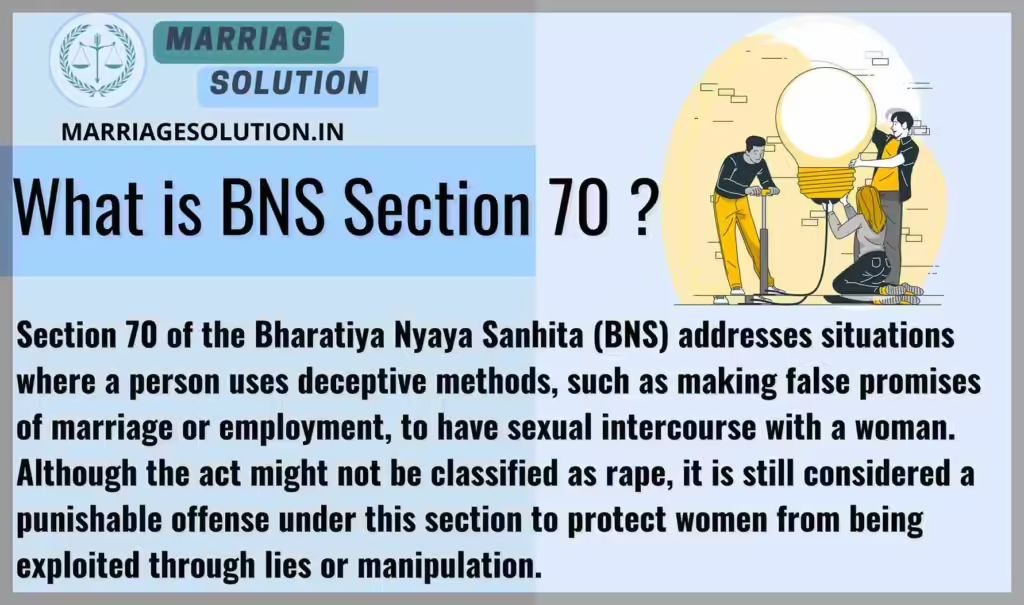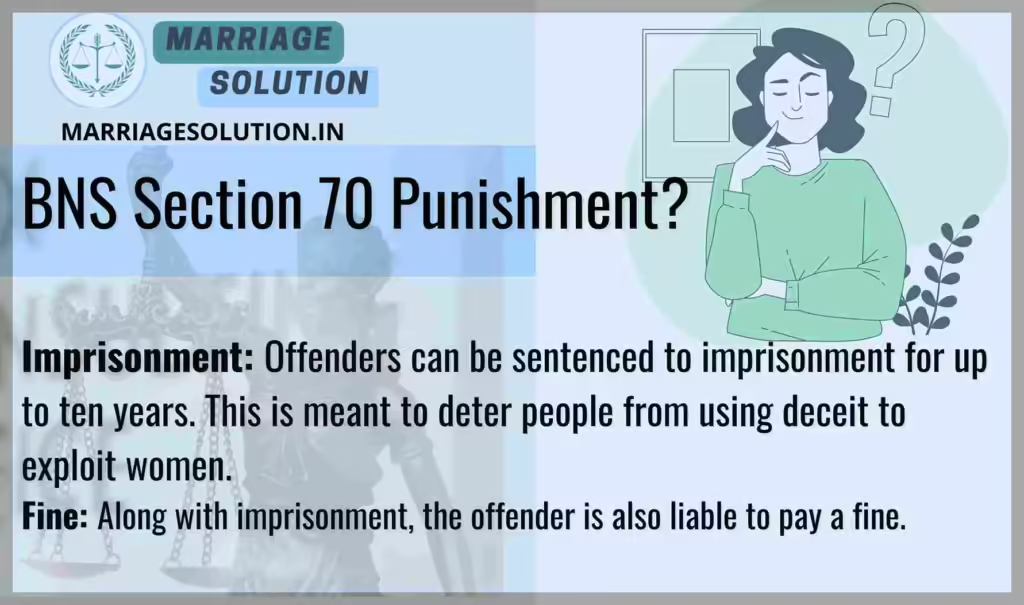Introduction of BNS 70
BNS 70 deals with the grave offence of gang rape. It recognizes situations where a woman is subjected to sexual assault by more than one person, acting together. This section highlights the seriousness of such crimes and provides for stringent punishments to ensure justice and deter offenders.
The provision corresponds to the earlier IPC Section 376D but has been restructured under the Bharatiya Nyaya Sanhita (BNS), 2023 to strengthen legal safeguards for women.
The Bharatiya Nyaya Sanhita (BNS) Section 70 replaces the old Indian Penal Code (IPC) Section 376D .
What is section 70 of BNS ?
Section 70 of the Bharatiya Nyaya Sanhita (BNS) addresses situations where a person uses deceptive methods, such as making false promises of marriage or employment, to have sexual intercourse with a woman. Although the act might not be classified as rape, it is still considered a punishable offense under this section to protect women from being exploited through lies or manipulation.

Section 70 gang rape
Section 70 of the Bharatiya Nyaya Sanhita (BNS), 2023, deals with the grave offence of gang rape. It corresponds to the earlier IPC Section 376D but is restructured with stronger punishment to ensure justice for victims and deter offenders.
1. Meaning of Section 70
- Gang rape occurs when a woman is raped by two or more persons acting together, or when one commits rape and others assist or share a common intention to commit the act.
- The law makes all such persons equally liable for the offence, regardless of who physically committed the sexual assault.
- Consent obtained under such circumstances is not valid consent in the eyes of law.
2. Purpose of Section 70
The main objectives are:
- To punish group sexual assaults more severely than individual cases of rape.
- To provide justice to victims who suffer greater trauma when attacked by multiple offenders.
- To act as a deterrent against organized or coordinated sexual crimes.
- To emphasize collective responsibility, so that not only the main perpetrator but also accomplices face equal punishment.
3. Essential Ingredients of Section 70
For this section to apply, these conditions must be present:
- Participation of two or more persons – either directly committing the act or aiding/assisting it.
- Common intention – offenders must share the intent to commit the crime.
- Sexual intercourse amounting to rape – defined under BNS Section 63.
- Absence of valid consent – consent obtained by force, coercion, or deceit is invalid.
- Victim is a woman – law recognizes the gender-specific nature of the offence.
4. Punishment under BNS Section 70
- Rigorous imprisonment for not less than 20 years, which may extend to imprisonment for life (meaning the remainder of natural life).
- Fine – offenders are also liable to pay fines, which may be directed as compensation to the victim.
- The severity reflects that gang rape is considered one of the most heinous crimes under Indian criminal law.
5. Examples of Section 70 in Action
- Example 1 (College Case): If three men collectively force a woman into sexual intercourse, all three are guilty of gang rape, regardless of whether all had physical intercourse.
- Example 2 (Shared Intention): If one man rapes while two others restrain the victim or keep watch, all three are equally guilty.
- Example 3 (Planned Crime): A group conspires to lure a woman under false pretenses and then commits rape—every member of the group is punishable.
- Example 4 (Accomplice Liability): Even if one person does not touch the victim but facilitates the act (locking the door, threatening the victim), he is treated as a principal offender.
6. Importance of Section 70
- Recognizes the higher degree of cruelty and trauma in gang rape cases.
- Ensures collective liability — no one can escape punishment by claiming a “lesser role.”
- Strengthens the legal system’s stance on women’s dignity and safety.
- Acts as a deterrent against organized sexual violence.
- Aligns with international standards for strict punishment of gang rape offences.
Section 70 BNS Overview
BNSS Section 70 makes it a crime for a man to obtain sexual relations with a woman by using deceitful means—such as false promises of marriage, fake job opportunities, or concealing his true identity. The law recognizes that consent given under deception is not genuine consent and ensures that such exploitation does not go unpunished. Even if these acts do not legally fall under the definition of rape, they are treated as serious violations of trust, dignity, and autonomy.
BNS 70 Key – Points
Protection from Deceit
The primary purpose of this section is to protect women from being tricked into sexual relationships by men who lie, manipulate, or conceal facts. It acknowledges that emotional and social exploitation can be just as harmful as physical force, and thus requires legal intervention.
False Promises Penalized
This provision directly targets individuals who make promises they never intend to keep. Common examples include men who falsely promise marriage, jobs, or promotions simply to induce a woman into a sexual relationship. Once exposed, such actions are punishable under Section 70.
Wide Definition of Deception
The law gives broad coverage to the term “deceitful means.” It not only includes false promises of marriage or employment but also situations where a man hides his true identity—for example, pretending to be unmarried when he is already married. This ensures that no form of intentional deceit used for sexual exploitation escapes legal scrutiny.
Serious Penalties
Those found guilty face rigorous imprisonment of up to ten years. The severity of the punishment highlights that exploitation through deceit is a serious crime and not a minor misrepresentation.
Fines Included
In addition to imprisonment, the offender is also liable to pay a fine. The fine works as both an additional punishment and, in some cases, a means of compensation for the woman who has suffered due to the deceit.
Not Rape, but Still Wrong
The law makes it clear that even if such acts do not legally qualify as rape under Section 63, they are still punishable offences. The key factor here is that the woman’s consent was obtained under false pretenses, which invalidates the consent.
Cognizable Offense
The offence is cognizable, meaning police can arrest the accused without needing a warrant. This allows quick legal action to prevent further harm or exploitation.
Non-Bailable Offense
The offence is non-bailable, which means the accused cannot automatically get bail. The court will carefully assess the seriousness of the case before deciding on release.
Tried in a Higher Court
Cases under this section are tried in a Sessions Court, which handles serious criminal offences. This ensures that such sensitive cases are judged by a higher authority capable of imposing strict punishments.
Focus on Women’s Rights
At its core, Section 70 emphasizes the protection of women’s dignity and rights. It recognizes that women should never be forced, tricked, or manipulated into sexual relations and that honesty and consent must always go together in any intimate relationship.
BNS 70 Punishment
Imprisonment: Offenders can be sentenced to imprisonment for up to ten years. This is meant to deter people from using deceit to exploit women.
Fine: Along with imprisonment, offenders may also have to pay a fine as a further punishment for their actions.

BNS 70 bailable or not ?
BNS Section 70 is non-bailable, meaning that the accused cannot easily secure bail and must remain in custody until the trial or a court decision.
Comparison: BNS Section 70 vs IPC Section 376D
| Section | Offence | Punishment | Bailable / Non-Bailable | Cognizable / Non-Cognizable | Trial By |
|---|---|---|---|---|---|
| BNS Section 70 | Gang rape — sexual intercourse committed by two or more persons acting together, or where persons share common intention to commit the act. | Rigorous imprisonment not less than 20 years, which may extend to life imprisonment; plus fine. (Victim-centred fines/compensation often emphasised.) | Non-Bailable | Cognizable | Sessions Court |
| IPC Section 376D (Old) | Gang rape under the old IPC—rape committed by two or more persons acting together (or by one with others making common intention). | Punishment typically included rigorous imprisonment (often a minimum term with possible extension to life imprisonment) and fine. Aggravated gang rape attracted the severest penalties under IPC amendments. | Non-Bailable | Cognizable | Sessions Court |
BNS Section 70 FAQs
What does BNS Section 70 cover?
It deals with cases where someone uses deceitful methods, like false promises of marriage, to engage in sexual relations with a woman.
What counts as “deceitful means” under this law?
“Deceitful means” can include making false promises of marriage or job offers, or hiding one’s real identity to gain a woman’s trust.
What is the maximum punishment for violating BNS Section 70?
The maximum punishment is ten years of imprisonment, along with a fine.
BNS 70 Is this a bailable offense?
No, BNS Section 70 is a non-bailable offense, meaning the accused cannot easily get bail.
Where is this offense tried?
Offenses under this section are tried in a Court of Session, which handles more serious criminal cases.
Conclusion
BNS Section 70 sends a clear and strong message that gang rape is one of the most heinous crimes under Indian law. By holding every participant equally responsible and prescribing rigorous imprisonment of not less than 20 years, extendable to life, this provision ensures justice for victims and acts as a deterrent for offenders. It emphasizes the protection of women’s dignity, bodily autonomy, and fundamental rights, while ensuring that no one can escape liability by shifting blame.
The restructuring of this provision under the Bharatiya Nyaya Sanhita strengthens India’s legal framework, ensuring swift justice and victim rehabilitation.
Need Legal Support?
If you are dealing with court cases, marriage problems, or any other legal issue, our team at Marriage Solution – Lawyer Help is here for you. Simply fill out our quick online enquiry form, and we’ll connect you with the right legal expert to support your needs.
Finished with BNS 69 ? Continue exploring the next provisions of the Bharatiya Nyaya Sanhita (BNS), 2023. Each section includes explanations, examples, and plain-language breakdowns for easy understanding.
- BNS Section 70 : Gang rape .
- https://marriagesolution.in/bns_section/bns-70/
- BNS Section 71 : Punishment for repeat offenders .
- https://marriagesolution.in/bns_section/bns-71/
- BNS Section 72 : Disclosure of identity of the victim of certain offences, etc .
- https://marriagesolution.in/bns_section/bns-section-72/
- BNS Section 73 : Printing or publishing any matter relating to Court proceedings without permission.
- https://marriagesolution.in/bns_section/bns-section-73/
- Section 74 BNS : Assault or criminal force to woman with intent to outrage her modesty.
- https://marriagesolution.in/bns_section/section-74-bns/
Full IPC Section List: https://marriagesolution.in/ipc-section-list
All Indian Law & Blogs: https://marriagesolution.in/indian-law/
Full BNSS Section List: https://marriagesolution.in/bnss_section-list
